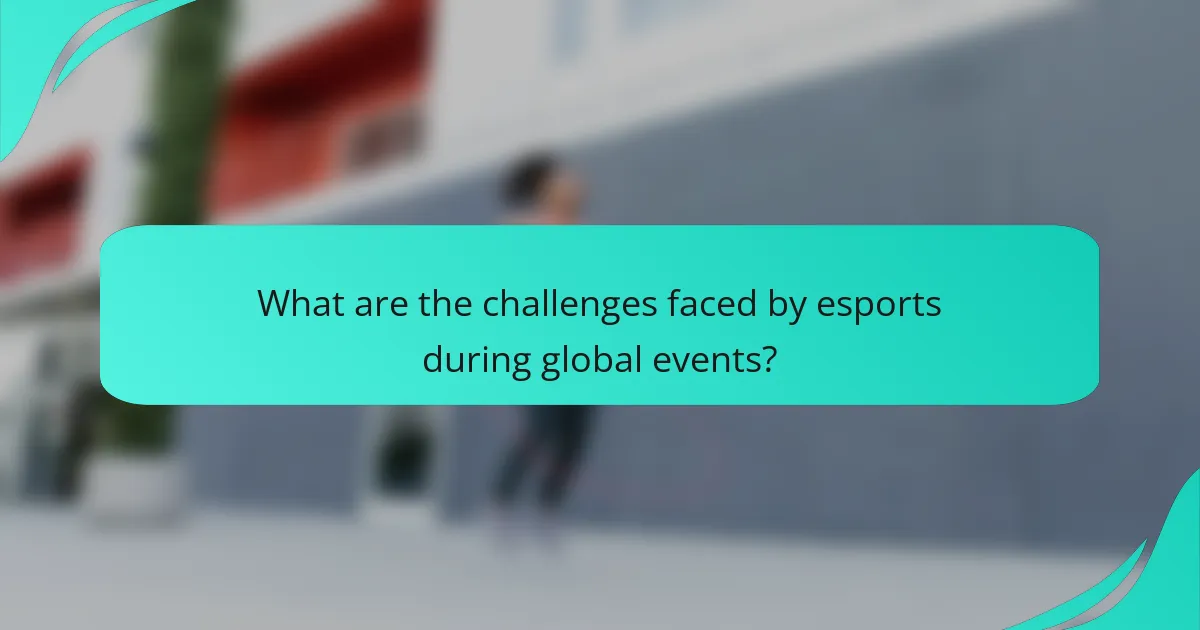The rise of global events in esports has dramatically increased visibility and attracted diverse audiences, fostering significant growth within the industry. These events not only create competitive opportunities but also enhance engagement and sponsorship potential, driving profitability. As esports continues to evolve, emerging markets and technological advancements present new avenues for investment and revenue generation.

How do global events influence the growth of esports?
Global events significantly boost the growth of esports by increasing visibility and attracting new audiences. These events create opportunities for engagement, sponsorship, and competition, which collectively enhance the industry’s reach and profitability.
Increased viewership and engagement
Global events attract millions of viewers, both online and in-person, leading to a surge in engagement. Major tournaments can draw audiences in the range of hundreds of thousands to millions, depending on the game and event scale.
This heightened viewership not only benefits the event organizers but also provides a platform for teams and players to showcase their skills, thereby increasing their fan base and marketability.
Major tournaments and sponsorships
Significant global events often feature major tournaments that attract sponsorship from various brands. These sponsorships can range from equipment manufacturers to beverage companies, providing substantial financial support to the esports ecosystem.
For example, tournaments like The International or League of Legends World Championship offer prize pools in the millions, incentivizing teams to compete at the highest level and drawing attention from potential sponsors looking to tap into the growing esports market.
Impact of international competitions
International competitions play a crucial role in shaping the esports landscape by fostering a sense of global community among players and fans. These events often highlight cultural exchanges and rivalries, enhancing the overall excitement and engagement.
Moreover, they can lead to increased investment in local esports scenes, as countries recognize the potential for economic growth and tourism associated with hosting such events. This can result in improved infrastructure and support for aspiring players and teams in various regions.

What are the key growth opportunities in esports?
The key growth opportunities in esports include expanding into emerging markets, attracting investment from traditional sports, and leveraging technological advancements in streaming. These factors are driving the industry’s rapid evolution and creating new revenue streams.
Emerging markets in Asia
Emerging markets in Asia, particularly in countries like China, India, and Southeast Asia, present significant growth potential for esports. These regions have large, young populations with increasing access to the internet and gaming platforms, leading to a surge in esports viewership and participation.
To capitalize on these opportunities, companies should consider local partnerships and tailor their content to resonate with regional audiences. Engaging local influencers and organizing tournaments can also enhance brand visibility and community involvement.
Investment from traditional sports
Investment from traditional sports organizations is a major driver of growth in the esports sector. Many professional sports teams and leagues are acquiring esports franchises or forming partnerships to tap into the lucrative gaming market.
This trend not only brings financial resources but also enhances credibility and visibility for esports. Traditional sports entities can leverage their existing fan bases to promote esports events, creating a crossover appeal that benefits both industries.
Technological advancements in streaming
Technological advancements in streaming are revolutionizing how esports content is consumed. High-definition streaming, interactive features, and virtual reality are enhancing viewer experiences, making esports more engaging and accessible.
Platforms like Twitch and YouTube Gaming are at the forefront, offering diverse content and monetization options for streamers. Brands looking to invest in esports should explore partnerships with these platforms to maximize their reach and engagement with audiences.

How do global events shape esports marketing strategies?
Global events significantly influence esports marketing strategies by creating unique opportunities for brands to engage with audiences. These events attract large viewership and participation, allowing marketers to tailor their campaigns to capitalize on heightened interest and visibility.
Brand partnerships and collaborations
Brand partnerships during global esports events can enhance visibility and credibility. Companies often collaborate with game developers, event organizers, and popular streamers to reach targeted demographics effectively. For instance, a beverage brand might sponsor a major tournament, providing exclusive drinks while gaining access to promotional opportunities.
Successful collaborations can lead to co-branded merchandise or in-game promotions, which resonate with fans and create a sense of community. Brands should consider aligning with events that reflect their values and target audience for maximum impact.
Targeted advertising during events
Targeted advertising during esports events allows brands to reach specific audience segments effectively. Advertisers can utilize data analytics to identify viewer preferences and behaviors, tailoring their messages accordingly. For example, a tech company might showcase gaming peripherals during a live stream, directly appealing to gamers watching the event.
Utilizing various ad formats, such as pre-roll videos or on-screen banners, can enhance engagement. Brands should monitor viewer engagement metrics to refine their strategies and ensure their advertising resonates with the audience.
Utilization of social media platforms
Social media platforms play a crucial role in shaping esports marketing strategies during global events. Brands leverage platforms like Twitter, Instagram, and TikTok to engage with fans in real-time, sharing highlights, behind-the-scenes content, and interactive polls. This engagement fosters a sense of connection and community among viewers.
Effective social media strategies include using event-specific hashtags and collaborating with influencers to amplify reach. Brands should also consider creating shareable content that encourages user participation, such as contests or giveaways, to maximize their impact during these high-visibility events.

What are the challenges faced by esports during global events?
Esports face several challenges during global events, including regulatory hurdles, logistical issues, and concerns regarding player health and safety. These factors can significantly impact the organization and execution of tournaments, influencing both player performance and audience engagement.
Regulatory hurdles in different regions
Regulatory hurdles vary widely across regions, affecting how esports tournaments are organized and conducted. Countries may have different laws regarding online gambling, broadcasting rights, and age restrictions, which can complicate event planning.
For example, some nations require licenses for esports betting, while others may have strict regulations on sponsorships. Understanding local laws is crucial for organizers to avoid legal pitfalls and ensure compliance.
Logistical issues for international tournaments
Logistical issues can arise when coordinating international tournaments, including travel arrangements, venue selection, and time zone differences. Ensuring that all participants can travel safely and on time is essential for a successful event.
Organizers must also consider the technical infrastructure needed for live streaming and gameplay, which can vary by location. A well-planned logistics strategy can help mitigate these challenges and enhance the overall experience for players and fans alike.
Player health and safety concerns
Player health and safety are paramount during esports events, especially in large gatherings. Concerns include physical well-being due to long hours of play, as well as mental health issues stemming from stress and competition pressure.
To address these concerns, organizers should implement measures such as regular breaks, access to medical personnel, and mental health resources. Prioritizing player welfare not only enhances performance but also fosters a positive environment for competition.

How can businesses leverage esports for advertising?
Businesses can effectively leverage esports for advertising by engaging with a passionate audience through tailored marketing strategies. This involves creating interactive content, utilizing influencer partnerships, and crafting immersive brand experiences that resonate with gamers.
Engagement through interactive content
Interactive content, such as polls, quizzes, and live-streamed events, can significantly enhance audience engagement in esports. By allowing fans to participate actively, brands can create a sense of community and loyalty. For instance, hosting a gaming tournament with branded challenges can attract participants and viewers alike.
Consider integrating gamification elements into your advertising campaigns. This could involve rewarding players with in-game items or discounts for completing specific tasks related to your brand. Such strategies not only boost interaction but also increase brand visibility within the gaming community.
Utilizing influencer marketing
Influencer marketing in esports involves partnering with popular gamers or streamers who can authentically promote your brand to their followers. These influencers often have dedicated audiences that trust their recommendations, making them powerful allies for brand promotion. Choose influencers whose values align with your brand for maximum impact.
When selecting influencers, consider their engagement rates and audience demographics. A smaller influencer with a highly engaged following can sometimes yield better results than a larger one with less interaction. Collaborating on sponsored streams or content can create organic exposure for your brand.
Creating immersive brand experiences
Creating immersive brand experiences in esports can captivate audiences and leave a lasting impression. This could involve setting up branded booths at esports events or developing virtual reality experiences that allow gamers to interact with your products in a unique way. Such experiences can enhance brand recall and foster emotional connections.
Additionally, consider sponsoring esports teams or tournaments to increase visibility. This not only showcases your brand to a wider audience but also aligns your company with the excitement and energy of competitive gaming. Ensure that your branding is seamlessly integrated into the experience to maximize impact.
